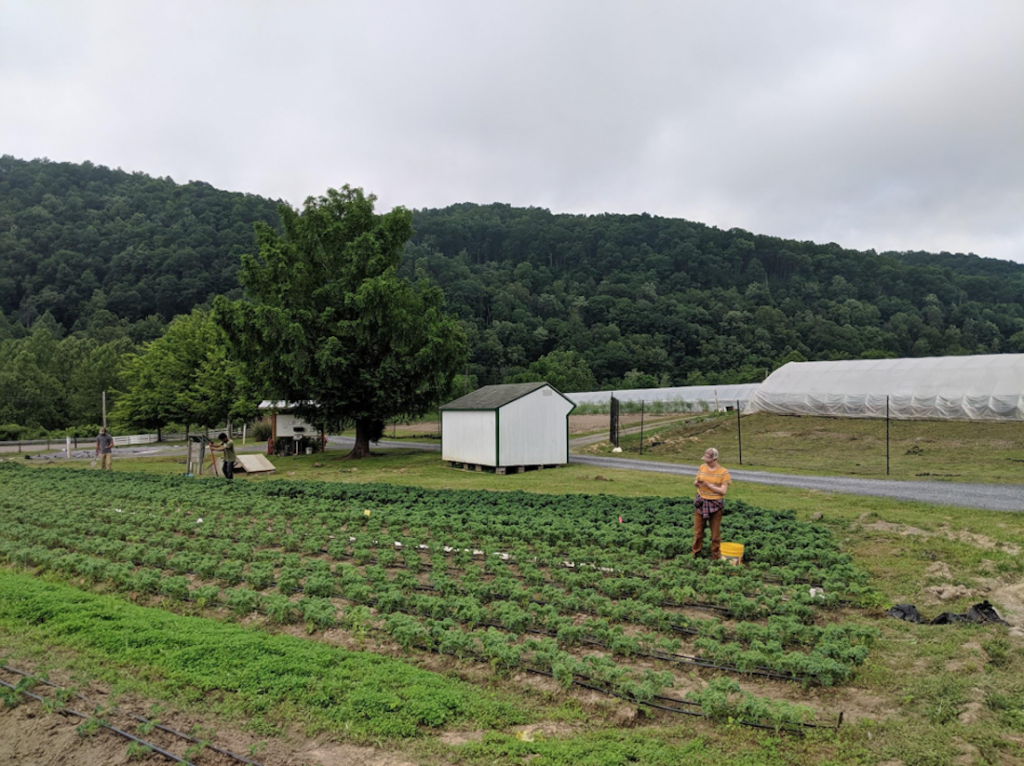By Annie Chester
As the sun began to dip behind the red barn, I had my first taste of dinner, which included fried green tomatoes and a salad, grown a few yards behind me. My meal was accompanied by the sound of friends, whom I had just met a few days prior, laughing, chitchatting, and chomping. We came together around wooden picnic tables because of our interest in the food system and this particular location, Sprouting Farms, a farm incubator and resource center in southern West Virginia with an ambitious vision to reclaim the food system in the New and Greenbrier River Valley.
In addition to growing its own food for market, Sprouting Farms provides aspiring farmers with training and land so that they can start sustainable agricultural businesses. After securing the USDA Rural Business Enterprise Grant in 2014, Project Director Fritz Boettner formally established Sprouting Farms in 2017. Other organizations recognized the potential in the project and invested, including the Appalachian Regional Commission.
I first learned about Sprouting Farms on this visit as an Appalachian Food Justice Fellow. The fellowship, organized by the Food Justice Lab at West Virginia University, connected students and community organizers from around the country and the world to resources, organizations, and individuals throughout West Virginia in order to grow a network of well-equipped, food justice-minded individuals.
Our current food system—which we depend upon for our survival—is inequitable. West Virginia is ranked among seven of the ten poorest states that are also the hungriest states. (The others are Alabama, Arkansas, Kentucky, Mississippi, New Mexico, and Louisiana. In West Virginia, nearly fifteen percent of households are food insecure and 19.4 percent experience some form of food hardship, the third-highest rate in the country. People in more than forty of West Virginia’s fifty-five counties experience difficulty accessing food because of a lack of grocery stores.
Without grocery stores, some West Virginians rely on processed foods—which keep longer,and can be found more readily at small retailers near their homes—to survive. This affects the health of residents. West Virginia has consistently maintained one of the highest obesity rates nationwide. Statistics like these are the result of a food system in which producers and retailers are focused on profit, not helping everyone access the nutritious food that they need to live a healthy life. Available fresh produce tends to come from across the country or across the world, while local farmers struggle to survive.
The food system is also a significant factor in the climate crisis. Earlier this summer, the United Nations Intergovernmental Panel on Climate Change (IPCC) released a report that described the damage of modern agricultural methods and food consumption habits. Without making necessary changes, the report warned, climate change will continue, as will damage to natural systems, which puts human survival in jeopardy. By changing what we eat on a large scale—like consuming less meat, and managing land more responsibly—many experts argue there is still hope for mitigating this crisis.
The urgency to reform the food system, therefore, has never been greater. In this dire context, several food justice organizations in West Virginia are modeling what it might look like to have a justice-based approach to food.
At Sprouting Farms, Assistant Director April Koenig, a West Virginia transplant, was drawn to the southern part of the state, along with her husband Doug, by the promise of cheap land and a dream to have a farm and a Community Supported Agriculture (CSA) venture. Shortly after getting settled, reality set in that there was simply no demand for a CSA in their sparsely populated, rural home. Instead of being discouraged, Koenig decided she needed to invest in larger efforts to improve the food system.
Early on, as Sprouting Farms was getting off the ground, Koenig connected with Boettner, the project director, and began volunteering. She also started to share her opinions about the direction the farm should take. As a registered nurse in a past life, Koenig brought a new perspective about the larger connection between food and health to Sprouting Farms. After growing tired of treating disease rather than working on prevention, Koenig wanted to work in agriculture to improve her neighbors’ health by encouraging fresh food options through education and increasing food access. Eventually, she convinced Boettner that having a staff member fluent in the language of healthcare as well as agriculture was crucial, and he hired her.
Since becoming an official part of the staff, Koenig has instituted a wide-array of initiatives, such as pop-up produce markets for kids .Likewise, she has ensured that the farm accepts Supplemental Nutrition Assistance Program (SNAP)benefits, a federal program commonly referred to as food stamps, so that low-income families can also access fresh produce. Not only has her work helped her community access more fresh produce, but it helped Sprouting Farms generate revenue and widen the market for its farmers.
“We more than tenfold expanded our anticipated sales around food access and health and wellness based on the relationships we’ve developed the last few months,” Koenig said. Sprouting Farms believes, to attain long-term sustainability, they must become a profitable business rather than a nonprofit constantly looking for funding. But the journey to becoming a self-sustaining business is still years away, primarily because their mission comes first.
“Our food hub is going to have to be subsidized for years, probably, because the way we do cost-share with the farmers is much more in favor of supporting their economic growth as opposed to what would be more economically viable for us independently to grow,” Koenig said.
In Summers County, where Sprouting Farms is situated, the food landscape is dominated by corporate retailers, most notoriously Dollar General. These companies control what food residents have access to, which is mostly processed foods. And they don’t work with local farmers. Furthermore, produce is often only available to those with a car. In parts of rural West Virginia, like Summers County, it can be an hour drive to a Walmart that stocks the freshest food.
Lucas Hilsbos, the production manager at Sprouting Farms, also cited the fact that most federal subsidies entering the state go to Dollar General and Walmart. These subsidies come in the form of tax breaks for companies or public assistance (e.g. SNAP) for poorly paid employees. With very little subsidy money going to small or local farmers, these retailers gain more power in the food system. “We’ve sort of built our hypothesis around scale,” Hilsbos said. “We look at that and we look at the fact that there are a lot of small farms barely making it. The farm decline is happening.”
Koenig echoed this sentiment: “[Small farmers] don’t have access to that global food system because they are too small. We don’t have the resources to leverage.” Sprouting Farms, therefore, is creating a food system in which farmers can access a wider market.
Hilsbos was born in Wheeling, West Virginia but grew up in the suburbs of Fairmont. His parents aren’t originally from the region, but fell in love with it and raised their son to be a proud Appalachian. “The Appalachian identity was just something that I grew up with, something that was talked about often,” Hilsbos said. His father is a physician and, as Hilsbos described it, “a sort of activist doctor” who took care of everyone from miners to people with addiction.
Hilsbos’s father instilled in him a sense of responsibility to improve the region. Through his studies in geography at WVU, Hilsbos landed the job at Sprouting Farms. He jumped at the opportunity because he wanted to stay in West Virginia and work in a more hands-on capacity in the food system. His current role combines working in the field with office work crunching numbers to produce data on how small farms can best survive.
Born and raised in Wheeling, but now based in Morgantown, Megan Govindan is another West Virginian dedicated to cultivating an alternative food system. As president of the board at Conscious Harvest Cooperative, Govindan coordinates the organization’s community initiatives. With a mission “to increase access to healthy, nutritious food in communities across West Virginia,” Conscious Harvest focuses not just on changing the food system but on creating a strong community. Current projects include subsidizing CSA shares for local families, renting out space in a community garden, and more.
“When you look at West Virginia, some of the infrastructure we need to be able to support our small farmers, aggregation and distribution of food, like a food broker of sorts, is something we don’t have, where Sysco and the US Foods do have that,” Govindan said. “We want to see farmers in business, and we want to be able to bring down the cost to the people that need it. So those are the two specific actions we’re addressing by kind of creating our own shared economy and doing things that we know we can work together on.”
Conscious Harvest started as a student organization at WVU but grew into a separate entity. Despite the organization being registered as a limited liability company (LLC), students are still the backbone of the organization. Govidan works directly with students, who earn internship hours or complete research. Student and volunteer work is essential because there is not enough money yet to pay staff (including Govindan herself). “The thing that works about alternative food initiatives and community food systems is that we’re reflecting what we want to see, trying to be able to create models that reflect that,” Govidan explained.
Right now, Conscious Harvest is focused on generating more money to buy more produce for residents who need it. A new community kitchen is the first step towards this goal. They are finishing renovations, but they hope the kitchen will generate revenue through the sale of memberships or bulk foods. They also hope the kitchen will become an education center and place for local food entrepreneurs to launch their businesses.
In the past, Conscious Harvest made money, which it reinvested into programming, through the sale of hot peppers. The project, called Conscious Heat, created a niche product “marketed through existing West Virginia agritourism efforts” (Agritourism refers to ventures like fairs, festivals, pumpkin patches, and more). Conscious Harvest also collaborated with FIRSTHAND Coffee Cooperative to create another value-added product, espresso salt (espresso beans ground and combined with West Virginia salt). Since the espresso salt venture, the relationship between Conscious Harvest and FIRSTHAND has grown. In fact, the folks at FIRSTHAND plan to hand over the organization to Conscious Harvest in the near future.
FIRSTHAND, like Conscious Harvest, originated as a student organization at WVU. FIRSTHAND takes a global approach, as opposed to concentrating on solely local projects. Creating a solidarity economy is a central element of its work. By reinvesting its profits into “social enterprises, cooperatives, and small businesses,” FIRSTHAND supports the mountain community in West Virginia and worker-owned cooperatives abroad.
The mission of FIRSTHAND was inspired by the fair trade movement. Bradley Wilson, now a professor in the geography department at WVU, “did his dissertation research at Rutgers on the landscape of fair trade branding and movements in the United States and comparing that to fair trade perceptions and realities in coffee growing regions and specifically Nicaragua” said Amanda Marple, general manager of FIRSTHAND Cooperative. That experience informed classes he taught at WVU, which ultimately motivated students to advocate for fair trade products on campus.
“[Wilson] introduced the idea of fair trade and doing solidarity work, and that fair trade as a label and a concept isn’t necessarily all that fair to folks who are actually growing and producing coffee,” Marple said. “There’s a lot of disconnect between what it means in a consumer-driven world and what it means in a producer-driven world.”
In the beginning, students tabled events and offered coffee to passers-by. Their goal was simply to start a conversation about fair trade and where coffee comes from. As the conversations evolved, students rebranded their organization and began selling fair trade coffee from larger, socially conscious, fair trade organizations out of their backpacks, in order to fundraise for a Nicaraguan coffee cooperative. Marple joined the organization as an undergraduate in 2012, two years after it started. Eventually, in 2016, the student group left the university so it could have more control outside of the institution. Once it left, the group was legally established as an LLC, but only for bureaucratic purposes. Instead it aims to operate structurally as a cooperative, ensuring that their profits are redistributed in ways that benefit mountain communities.
For some time they used their coffee profits to support La Hermandad, the Nicaraguan cooperative where Wilson did his dissertation research. After reassessing the relationship, they decided to move to supporting The Working World, a global organization that builds “cooperative businesses in low-income communities” around the world, including Nicaragua About two years after it started, FIRSTHAND began selling coffee as a brand, employing a local roaster. This partnership allowed the roaster to make more connections, which ultimately helped grow his business. FIRSTHAND further supported the local West Virginia food economy by promoting coffee as an add-on to CSA shares. The profits generated from this went directly to the farmers participating in the CSA.
In the face of a giant broken food system, even efforts like FIRSTHAND can feel like just a drop in the bucket. But local food organizers say it’s an important start. “It’s hard to know these things and to feel so small within the system,” Marple said. “But having a more collective or cooperative approach is something to make you feel not quite as lost or as individualized.” ■
Annie Chester was born and raised in Pittsburgh. She writes for and co-founded the Appalachian journalism project, expatalachians. She has lived in Corsica, France, and will move again to Scotland to start her postgraduate studies at the University of Edinburgh. Her writing and research reflect her interest in the environment and its relation to society and globalization.
Cover image of Wayne Wikle (left) and Josh Evans harvesting kale at Sprouting Farms. Photo courtesy Sprouting Farms.
Belt Magazine is a 501(c)(3) nonprofit organization. To support more independent writing and journalism made by and for the Rust Belt and greater Midwest, make a donation to Belt Magazine, or become a member starting at just $5 a month.








